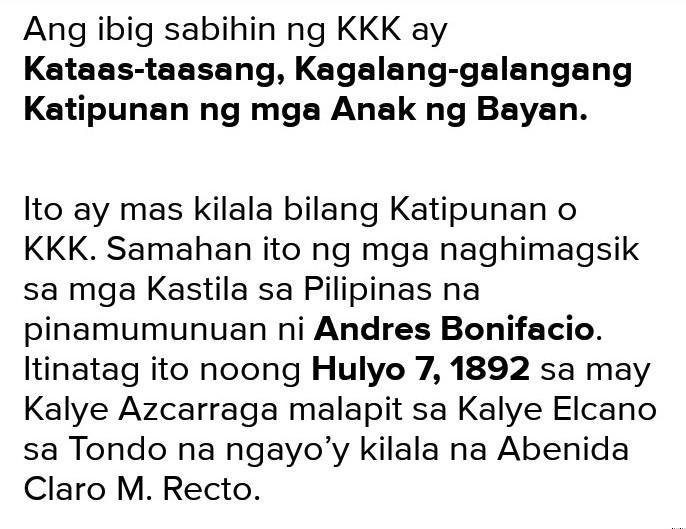The phrase “ano ang ibig sabihin ng kkk” captures the curiosity about a significant historical movement in the Philippines. KKK stands for “Kataas-taasang, Kagalang-galangang Katipunan ng mga Anak ng Bayan,” which translates to “Supreme and Honorable Society of the Sons of the People.”
This organization played a crucial role in the fight for Filipino independence during the Spanish colonial era. Understanding its meaning and impact offers insight into the nation’s journey toward freedom and identity. Join us as we delve deeper into the rich history and significance behind the KKK and its enduring legacy.
“`html
What Does “Ano ang Ibig Sabihin ng KKK” Mean?
The phrase “KKK” carries significant historical context, especially in the Philippines. To truly understand its implications, we need to explore its origins, meanings, and the critical role it played in the nation’s history. In this article, we’ll dissect the phrase “ano ang ibig sabihin ng KKK,” delving into its roots and its importance in Filipino culture and history.
Understanding the Origins of KKK
The term “KKK” stands for “Kataastaasan, Kagalang-galangang Katipunan ng mga Anak ng Bayan.” This translates to “Highest and Most Honorable Society of the Sons of the People.” The Katipunan was a revolutionary society founded in 1892 by Andres Bonifacio, and it aimed to gain independence from Spanish colonial rule. Here’s a breakdown of its foundational components:
- Kataastaasan: This means “highest” or “supreme,” showcasing the society’s lofty aspirations.
- Kagalang-galangang: This translates to “honorable,” indicating the respect and integrity the society sought to uphold.
- Katipunan: This refers to the group or society itself, emphasizing unity among its members.
- Anak ng Bayan: This phrase means “children of the nation,” highlighting the collective identity of Filipinos striving for freedom.
The Role of KKK in Philippine History
The Katipunan played an integral part in the Philippine Revolution. Here are a few key points about its historical significance:
- Founding of the Katipunan: The organization was created to provide a platform for Filipinos who wanted to fight against Spanish oppression. It aimed to inspire individuals to join the cause for freedom.
- Membership: Initially, the Katipunan started with only a few members but quickly expanded, gathering thousands of individuals committed to achieving independence.
- Revolutionary Activities: The Katipunan organized various revolutionary activities, including discussions on strategies to oppose Spanish rule, spreading nationalist ideas, and planning uprisings.
- Leadership: Andres Bonifacio, often called the “Father of the Revolution,” led the organization. His vision and determination deeply influenced the movement.
The Symbolism of KKK
The KKK symbolized much more than just an organization; it represented hope, courage, and the relentless pursuit of freedom. Here are some of the symbols associated with the Katipunan:
The Flag
The flag of the Katipunan was a critical emblem featuring a red background with a white sun and three stars. This flag signified:
- Red: Symbolizing bravery and the blood shed in the struggle for freedom.
- White Sun: Representing enlightenment and a new beginning for the Filipino people.
- Three Stars: These stars stood for the major geographical regions of the Philippines: Luzon, Visayas, and Mindanao.
The Katipunan Oath
Joining the Katipunan required members to take an oath, pledging loyalty to the cause. This oath was not just ceremonial; it instilled a personal commitment to fight for the rights and freedoms of fellow Filipinos.
KKK’s Influence on Modern Philippine Society
The spirit of the Katipunan continues to influence Filipino culture and values. Here’s a glimpse of how KKK resonates in today’s society:
- National Identity: The KKK has become a symbol of national pride and identity. Many Filipinos view their struggle against colonialism as a vital part of their heritage.
- Social Movements: Modern social movements in the Philippines often reference the ideals of the Katipunan, drawing inspiration from its fight for freedom and justice.
- Education and History: Subject matter about the KKK is taught in schools, emphasizing the importance of understanding one’s history and the sacrifices made for freedom.
Understanding KKK in the Context of Philippine Culture
The KKK serves as a foundational story, shaping Filipino culture and perspectives on governance, freedom, and community. Here’s how it impacts cultural values:
Value of Community
The Katipunan stressed the importance of unity and collective action. This sense of community remains strong in Filipino culture, where bayanihan—the spirit of communal unity and cooperation—thrives.
Resilience and Courage
The struggles faced by the Katipunan fostered values of resilience and courage. Filipinos often draw from this legacy to overcome challenges, whether personal or societal.
The phrase “ano ang ibig sabihin ng KKK” encapsulates a rich history and cultural significance for Filipinos. Understanding its meaning goes beyond language; it involves recognizing the sacrifices and aspirations of those who fought for independence. The Katipunan’s legacy lives on, shaping contemporary Filipino identity and inspiring future generations to continue the pursuit of freedom, justice, and unity.
“`
Bago na pala ang ibig sabihin ng KKK ngaon
Frequently Asked Questions
What is the historical context of KKK in the Philippines?
The KKK, or Kataas-taasan, Kagalang-galangang Katipunan ng mga Anak ng Bayan, was a revolutionary society founded in 1892 by Andres Bonifacio. It aimed to gain independence from Spanish colonial rule. The KKK played a crucial role in the Philippine Revolution, uniting Filipinos against foreign oppression and advocating for national sovereignty and social reforms.
How did the KKK influence Philippine nationalism?
The KKK significantly shaped Philippine nationalism by fostering a sense of unity among Filipinos. It encouraged the idea of fighting for freedom and self-determination. The organization’s emphasis on national identity and cultural pride helped ignite revolutionary sentiments that eventually led to the quest for independence from colonial powers.
Who were the key figures associated with the KKK?
Andres Bonifacio, the founder of the KKK, is the most notable figure associated with the organization. Other key individuals include Emilio Jacinto, who contributed to the movement through his writings, and Apolinario Mabini, who later became an influential leader in the Philippine Revolution. These figures played vital roles in the organization’s strategies and philosophies.
What symbols represent the KKK and their significance?
The KKK is represented by several symbols, including the Katipunan flag, which features a sun and three stars symbolizing freedom and the country’s aspirations. The color red represents bravery, while the white signifies purity. These symbols encapsulate the values of courage, patriotism, and the quest for independence that the KKK stood for.
How is the KKK remembered in Philippine culture today?
Today, the KKK is celebrated as a symbol of Filipino heroism and resistance against colonialism. Schools and cultural institutions teach about its history, and commemorative events honor the sacrifices made by its members. The KKK’s legacy continues to inspire movements for social justice and national pride in modern Philippine society.
Final Thoughts
The term “KKK” holds significant historical and cultural meaning in the Philippines. It originally stood for “Kataastaasan, Kagalanggalangang Katipunan ng mga Anak ng Bayan,” a revolutionary society founded to fight against Spanish colonization.
Today, it symbolizes patriotism and the struggle for freedom. Understanding “ano ang ibig sabihin ng kkk” sheds light on its impact in Filipino history and the ongoing fight for national identity. Embracing this knowledge fosters appreciation for the values of bravery and unity that the KKK represents.
















